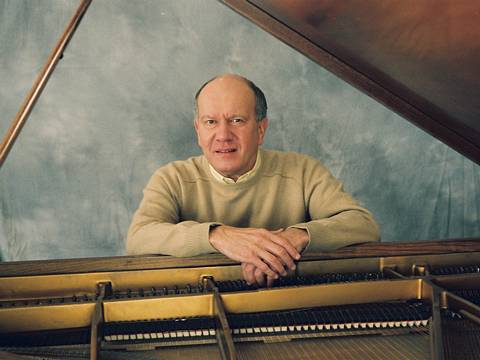|

Pianistic excellence
John Lill and Prokofiev's Eighth Sonata at sixty,
enjoyed by MALCOLM MILLER
As befits an artist of the calibre of John Lill, the celebrity recital he gave as part of this year's Hampstead and Highgate Festival on 17 May 2004, at the Parish Church of St John-at-Hampstead, north-west London, UK, was an inspiring alliance of pianistic excellence with depth of interpretation. The well balanced yet richly designed programme featured monumental accounts of sonatas by Prokofiev and Beethoven, composers with whom Lill's concert and recording career has been closely involved, ever since his rise to international stardom upon winning the 1970 Tchaikovsky Award in Moscow. As the capacity audience discovered, Lill does not merely play the music, but lives in it, communicating a profound conception of the work as a whole as well as its myriad details. The concert opened with a riveting account of Haydn's late E flat Sonata. The work flowed with majestic aplomb, its stirring introductory flourish caressingly contrasted by tiptoe delicacy, pursued in a finely textured tapestry that brought out some luminescent lower voices and underlines Haydn's motivic ingenuity in this proto-Beethovenian masterwork. The development in particular with its wispy motifs exchanged across various registers is reminiscent of Beethoven's Waldstein sonata, but that connection emerged even more clearly in Lill's intensely dramatic narration of the slow movement, with its serenity disturbed by passionately stretched intervals. Here one could relish plateaus of stillness before the onset of bristling counterpoint and passagework in the finale.
Aptly chosen for Lill's sixtieth birthday season, since it was composed in 1944, Prokofiev's eighth sonata received a memorable performance of bravura and cataclysmic energy. One wonders how it was received by the Soviet public at its première by Emil Gilels, during the middle of World War II and Stalin's regime. Certainly the music rages with fervent defiance, yet whether or not this is specifically against totalitarianism or war-torn conditions is not clear. Whatever its overt or implied politics, the work also rages at the modernist condition of music, its searching linearity in the first movement veering into the no-man's land of chromatic dissonance yet taking refuge within the borders of tonal territory. Arresting outbursts of passion in the development and coda of the first movement were balanced by a lyricism that Lill emphasised, especially poignantly in the second subject sustained over an insistent pedal point. Neo-classical allusions in the unexpectedly concise slow movement provided a moment of relief before the formidable mushroom cloud unleashed in the finale. There was no flagging in the fierce and fraught fortissimi that emanated from Lill's superb dexterity, shaping the sonorities of his turbo-powered Fazioli with orchestral textures of breathtaking speed and complexity.

John Lill
|
Though one could hardly imagine a more compelling musical drama, one's ideas were challenged by the electric interpretation of the Appassionata Sonata Op 57 which concluded the second half of the programme. Lill began with a poetic characterisation of Schumann's Kinderszenen in which each miniature unfolded with involving poise and shading. Not only the famous Traumerai but every piece was focused, imbued with startling emphases of inner voices and whispered shading of the bass lines. The immediacy and attraction of Lill's pianistic sound made for an enthralling identification with the narrator of these childhood 'scenes'. Yet it was in Beethoven's Op 57 that Lill's command at the keyboard was fully evident. The first movement was full of surprise and tension, rhythmic and textural control, the anacrusis motif subtly and supply underlined. The relatively fast second movement captured the flickering evolution of the theme through various registers and figurations, while one was transported at jet propelled impetus through finale's sound barriers. It was a highlight of the week-long Hampstead and Highgate Festival and a credit both to its Chairman Helen Lawrence and new Festival Director George Vass. Events such as this and the well attended and expertly performed 'Youth Choirs in Concert', which featured the South Hampstead Girls School choirs under their charismatic director Diane Kiverstein on Wednesday 19 May, amply demonstrate the value of programmes designed to involve local artists and groups, yet reach large audiences, for what has become a major highlight of London's concert calendar.
|